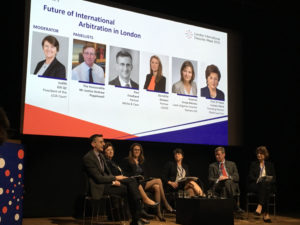The 2019 London International Disputes Week continued yesterday with the Flagship Conference on the Present and Future of London International Disputes, in the unique setting of the National Gallery, in Trafalgar Square.
Professor Richard Susskind OBE, IT Advisor to the Lord Chief Justice, discussed the role of Technology and the Future of Dispute Resolution. Richard Susskind suggested that rather than stressing the same paradigm of quicker and cheaper resolution of disputes, one should consider the value lawyers bring to those they advise. As such, in the past fifteen years, one can note that the discussion has been centered on “more for less”, with services being decomposed in parts and outsourced. In this context, technology can replace some of the work lawyers do, such as document review, electronic disclosure, etc. In addition to this, Richard Susskind looked specifically at the role of technology in the context of the future of legal services and noted that there has been an exponential growth of technology in this field, with emphasis on the capability of technology to respond to most varied situations. For example, the increasing role of Online Dispute Resolution (ODR), which, in the definition of Richard Susskind, is an electronic form of Alternative Dispute Resolution and which includes e-negotiation, e-mediation and other forms of ODR, such as e-neutral evaluation. With this, the question raised by Richard Susskind was whether in dispute resolution there is, indeed, a need to physically congregate and, by way of consequence, whether a court is a service or a place. With this, Susskind envisages two generations of online courts, lato sensu: the first generation, dealing with low-value disputes and judges rendering their judgments online, and a second generation of online courts where judges are replaced by artificial intelligence. Finalizing, Richard Susskind urged the public to consider two points. First, that focus should be on dispute prevention, rather than on dispute resolution, and second, that clients do not necessarily need lawyers, but they need the outcomes the lawyers bring, and, particularly on this latter point, technology can be of utmost importance.
Source: Crina Baltag
Continuing the afternoon of the Flagship Conference at the London International Disputes Week, the panel on the Future of International Arbitration in London was moderated by Judith Gill QC, President of the LCIA Court, and had as panellists The Honourable Mr Justice Andrew Popplewell, Paul Friedland, White & Case, Domitille Baizeau, LALIVE, Susanne Gropp-Stadler, Siemens AG and Professor Dr Nayla Comair-Obeid, Obeid Law Firm. The focus of the discussion was on London as a seat of arbitration and the challenges it is likely to face in the context of Brexit. Nayla Comair-Obeid responded to the question addressed by Judith Gill as to what makes London a preferred seat for arbitration by pointing out that the latest Queen Mary/White & Case Survey on the Evolution of International Arbitration places London first, before Paris, Singapore, Hong Kong and Geneva, as the preferred seat, with more than half of the respondents believing that Brexit will likely have no impact on the use of London as seat. Some of the advantages of London as a seat of arbitration highlighted by Nayla Comair-Obeid were the efficiency of the English courts and the 1996 English Arbitration Act, as well as the quality of the legal education and of the legal services provided by lawyers and law firms. Paul Friedland turned to the threats to London as a preferred seat of arbitration and indicated regionalization – the increased recognition of regional arbitration hubs, in particular in East Asia and the Middle East – as the major challenge. Paul Friedland also emphasized that such regionalization is accompanied by globalization of legal practices, with major law firms being now able to advise clients in different parts of the world. Domitille Baizeau focused on the “English way” of conducting international arbitration, and, in this context the role of the Prague Rules on the Efficient Conduct of Proceedings in International Arbitration. Related to this, Andrew Popplewell mentioned that irrespective of the way arbitration is conducted, it has to be swifter and cheaper and, as such, the question is one of pro-activeness of arbitrators in the light of the due process principle. Going back to London as a preferred seat of arbitration, Susanne Gropp-Stadler underscored the fact that London offers different alternatives for different types of disputes, and indicated the important role not only of LCIA, but also of other institutions, such as the London Maritime Arbitrators Association or the Grain and Feed Trade Association Arbitration. Looking at the impact of Brexit on London as a preferred seat of arbitration, Susanne Gropp-Stadler indicated that we will probably become aware of the impact of Brexit only in few years, when long-term contracts concluded in the past two years would yield their disputes. Nevertheless, Susanne Gropp-Stadler emphasized that the issue is one of perception, in the sense that while Brexit might not have any impact on arbitration, parties might be pushed away by the way Brexit is handled by the British government.
The Flagship Conference concluded with the keynote speech by The Right Honourable David Gauke MP, Lord Chancellor and Secretary of State for Justice, who highlighted that one of the reasons parties choose London as a seat of arbitration is the trust they have in the English legal system.
________________________
To make sure you do not miss out on regular updates from the Kluwer Arbitration Blog, please subscribe here. To submit a proposal for a blog post, please consult our Editorial Guidelines.



